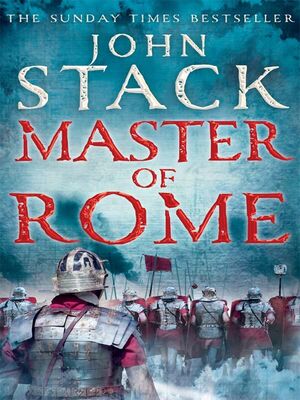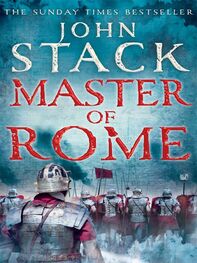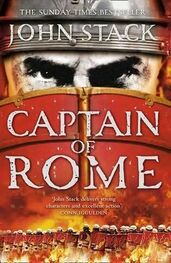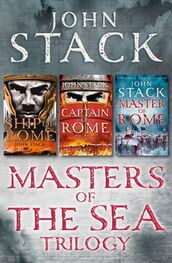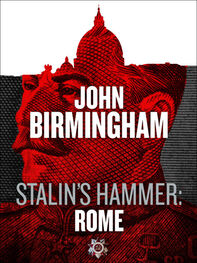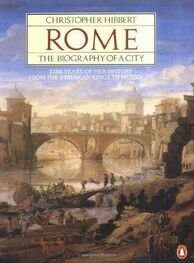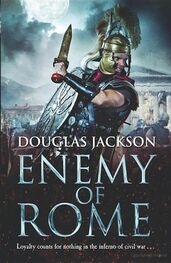‘Welcome to Rome, citizen,’ Septimus said with a smile, and Atticus laughed as he took his friend’s hand.
Septimus stretched out his other hand and turned Atticus towards the crowd.
‘Down there,’ he said, and he indicated the front row of the crowd at the foot of the steps.
Atticus looked and he immediately saw Hadria staring up at him. She looked as she had done the first night he met her, and in an instant his heart relived the sensations of that first encounter. She was smiling, her face lit with an ecstatic glow that spoke of every feeling she had ever shared with him. To her side was Antoninus, her father. He too was smiling; as Atticus caught his eye, the former centurion nodded slightly. Atticus looked to Hadria again and he realized that the most precious thread that had once bound him to Rome was reforming within him, that the social barriers that had once severed that bond had fallen, never to be rebuilt, and he returned her smile.
He looked out over the crowd to the temples and buildings surrounding the Forum, and beyond to the Servian Wall that encompassed the city. He could see the verdant haze that marked the southern horizon, and in his mind’s eye he travelled over two hundred leagues to the city of Locri. There, the bones of his ancestors lay in arid soil, generations deep. They had been proud people, as was their son, and Atticus thought once more on the city that was now his home and the fellow Romans who stood about him. He would always be of Locri and Magna Graecia, his ancestors deserved no less, but from this day he would also be of Rome, and in his heart he was proud that, one day, his sons would be as he had become: Roman.
Master of Rome opens with a brief account of the Battle of Tunis in 255 BC. The Carthaginians led their attack on the Roman infantry line with elephants, while the Roman cavalry, who were outnumbered by four to one, were quickly routed. Thereafter the Carthaginian cavalry attacked the flanks of the hard-pressed legionaries and only two thousand Romans on the left escaped, while Marcus Atilius Regulus led a brief but ultimately unsuccessful breakout at the head of five hundred men. The Carthaginian army was led by a Spartan, Xanthippus, who, according to Polybius, the Greek historian, left Carthage after the victory.
Upon hearing news of the defeat, the two consuls for that year, Marcus Aemilius Paullus and Servius Fulvius Paetinus Nobilior led three hundred and fifty ships to Aspis to evacuate the survivors. They were challenged by two hundred Carthaginian ships and a brief battle ensued off Cape Hermaeum, one that ended in defeat for the Carthaginians with the loss of one hundred and fourteen ships captured. Polybius tells us that the consuls were eager to build on this defeat by attacking cities on the southwestern coast of Sicily. They were advised against this by the experienced seamen of the fleet, due to the likelihood of adverse weather; however, they ultimately ignored this advice and the Roman fleet, enlarged with captured Carthaginian galleys, was caught in a storm off Camarina. All but eighty ships were destroyed. Estimates of the dead vary, but certainly run into the tens of thousands.
Gnaeus Cornelius Scipio Asina was elected consul in 254 BC, a significant political achievement given his defeat at Lipara six years earlier, and with Aulus Atilius Caiatinus they captured Panormus after a successful siege.
The fate of Marcus Atilius Regulus after the Battle of Tunis is shrouded in myth. Polybius does not record his fate; however, other historians writing of the events hundreds of years later claim that he travelled to Rome as a Carthaginian ambassador, only to advise the Romans to reject any agreement. Bound by honour, he then returned to Carthage where he was tortured and killed.
The siege of Lilybaeum began in 250 BC. From the outset the Romans had difficulties imposing a blockade and the Carthaginians’ local knowledge of the shoals allowed them to breach the siege line several times. The most notable of these blockade runners was a man known as ‘The Rhodian’. He was Carthaginian, although in Master of Rome I have changed his nationality for narrative purposes, and he bested the Roman fleet many times before he was eventually caught.
In 249 BC, as the siege progressed at Lilybaeum, the consul for that year, Publius Claudius Pulcher, decided to mount a surprise attack on the Carthaginian fleet anchored at nearby Drepana. Prior to the battle he undertook a ritual to invite the favour of the gods; however, when the sacred chickens refused to eat he is said to have thrown them overboard in a rage, demanding that they drink instead.
The ensuing battle unfolded as described. The Roman fleet arrived in disarray at Drepana after a night-time approach and the Carthaginian fleet slipped out of the inner harbour only to turn and engage the unprepared Roman line, hemming them in against the coastline. The Romans were heavily defeated, with ninety-three ships captured, although Pulcher escaped with some thirty ships. He was subsequently tried for the crime of perduellio for his defeat. Drepana is notable as it marked the only large-scale naval battle that the Carthaginians won over the course of the entire war.
Given the defeat at Drepana (and subsequent destruction in a storm of another Roman fleet off Cape Pachynus, near Syracuse, which I did not include in Master of Rome), it is possible that the Carthaginians could have pushed the war to a conclusion at this point. However, they did not exploit the opportunity and while the Romans continued to fight on land, the Carthaginians resorted to indecisive raiding of the southern coastline of Italy.
In 243 BC the Romans decided to build a new fleet. Given the scale of their previous losses it is a decision that speaks to their desire to win at all costs, and two hundred quinqueremes were built using funds donated by private citizens. As before, Lilybaeum and Drepana were threatened, and Polybius states that Rome’s aim was to force the Carthaginians into a decisive battle.
The Romans crews worked hard to prepare for battle and by 241 BC they were well trained, fed and equipped. In contrast, after Drepana, the Carthaginians had decommissioned many of their ships and it took them some time to muster a fleet of some two hundred and fifty galleys to counter this new threat from Rome.
On the 10 March 241 BC the two fleets clashed in what was to be the final battle of the war. The Roman fleet was commanded by consul Caius Lutatius Catulus, supported by a senior praetor, Quintus Valerius Falto. The Carthaginians were led by a man named Hanno, while Hamilcar Barca commanded the army on land (as before I placed Barca in command of the naval battle for narrative purposes). The weather was firmly in the favour of the Carthaginian fleet and, with the wind to their backs, they sailed towards Lilybaeum from the Aegates Island of Hiero (present-day Marettimo). Catulus, faced with a heavy swell, gambled on the skill of his crews, and, anxious not to allow the Carthaginian fleet to reach the army besieged at Lilybaeum, sailed out from another of the islands to intercept the Carthaginians. The battle was hard fought but the Romans were victorious, and Polybius states that the Carthaginians lost fifty ships sunk and seventy captured while others escaped after the wind changed during the battle.
Aegates Islands was the decisive victory that the Romans had planned for, and it ended the First Punic War. Hamilcar Barca and Caius Lutatius Catulus negotiated the terms. The central conditions of the peace were: complete evacuation of all Carthaginian forces from Sicily, the return of all Roman prisoners freely while the Carthaginians had to pay a ransom for their own, and the payment of an indemnity of 3,200 Euboean talents over twenty years to the Roman state. The treaty was duly signed, ending twenty-three years of war between the two states.
Читать дальше